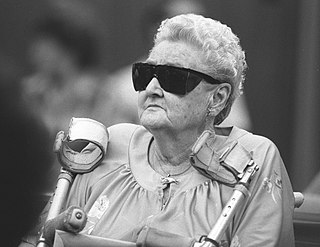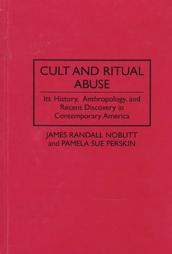Related Research Articles
The Satanic panic is a moral panic consisting of over 12,000 unsubstantiated cases of Satanic ritual abuse starting in the United States in the 1980s, spreading throughout many parts of the world by the late 1990s, and persisting today. The panic originated in 1980 with the publication of Michelle Remembers, a book co-written by Canadian psychiatrist Lawrence Pazder and his patient, Michelle Smith, which used the controversial and now discredited practice of recovered-memory therapy to make claims about satanic ritual abuse involving Smith. The allegations, which arose afterward throughout much of the United States, involved reports of physical and sexual abuse of people in the context of occult or Satanic rituals. Some allegations involve a conspiracy of a global Satanic cult that includes the wealthy and elite in which children are abducted or bred for human sacrifice, pornography, and prostitution.

A moral panic is a widespread feeling of fear that some evil person or thing threatens the values, interests, or well-being of a community or society. It is "the process of arousing social concern over an issue", usually perpetuated by moral entrepreneurs and mass media coverage, and exacerbated by politicians and lawmakers. Moral panic can give rise to new laws aimed at controlling the community.

The National Society for the Prevention of Cruelty to Children (NSPCC) is a British child protection charity founded as the Liverpool Society for the Prevention of Cruelty to Children (LSPCC) by Thomas Agnew on 19 April 1883. The NSPCC lobbies the government on issues relating to child welfare, and creates child abuse public awareness campaigns. Since the 1980s, the charity has had statutory powers allowing it to apply for help on behalf of children at risk. In the 1990s, the charity's publication, Satanic Indicators, fueled panic in social workers who went and accused parents and removed children from homes when they should not have. It operates a telephone help line. The Paddington Bear character has partnered with the charity to raise funds for the charity.

Lawrence Pazder was a Canadian psychiatrist and author. Pazder wrote the discredited biography, Michelle Remembers, published in 1980, with his patient Michelle Smith, which claimed to detail satanic ritual abuse.

The McMartin preschool trial was a day care sexual abuse case in the 1980s, prosecuted by the Los Angeles District Attorney, Ira Reiner. Members of the McMartin family, who operated a preschool in Manhattan Beach, California, were charged with hundreds of acts of sexual abuse of children in their care. Accusations were made in 1983, with arrests and the pretrial investigation taking place from 1984 to 1987 and trials running from 1987 to 1990. The case lasted seven years but resulted in no convictions, and all charges were dropped in 1990. By the case's end, it had become the longest and most expensive series of criminal trials in American history.

Michelle Remembers is a discredited 1980 book co-written by Canadian psychiatrist Lawrence Pazder and his psychiatric patient Michelle Smith. A best-seller, Michelle Remembers relied on the discredited practice of recovered-memory therapy to make sweeping, lurid claims about Satanic ritual abuse involving Smith, which contributed to the rise of the Satanic panic in the 1980s. While the book presents its claims as fact, and was extensively marketed on that basis at the time, no evidence was provided; all investigations into the book failed to corroborate any of its claims, with investigators describing its content as being primarily based on elements of popular culture and fiction that were popular at the time when it was written.

The Courage to Heal: A Guide for Women Survivors of Child Sexual Abuse is a self-help book by poet Ellen Bass and Laura Davis that focuses on recovery from child sexual abuse and has been called "controversial and polarizing".
Day-care sex-abuse hysteria was a moral panic that occurred primarily during the 1980s and early 1990s, and featured charges against day-care providers accused of committing several forms of child abuse, including Satanic ritual abuse. The collective cases are often considered a part of the Satanic panic. A 1982 case in Kern County, California, United States, first publicized the issue of day-care sexual abuse, and the issue figured prominently in news coverage for almost a decade. The Kern County case was followed by cases elsewhere in the United States, as well as Canada, New Zealand, Brazil, and various European countries.

Peter Hugh McGregor Ellis was a New Zealand childcare worker who was wrongfully convicted of child sexual abuse. He was at the centre of one of the country's most enduring judicial controversies, after being found guilty in June 1993 in the High Court on 16 counts of sexual offences involving children in his care at the Christchurch Civic Creche and sentenced to 10 years' imprisonment. He maintained his innocence until his death 26 years later and was supported by many New Zealanders in his attempts to overturn his convictions, although others believed he was guilty. Concerns about the reliability of the convictions centred on far-fetched stories told by many of the children and the interview techniques used to obtain their testimony.
The Faith Chapel Church ritual abuse case was a case of a developmentally disabled individual charged with child sexual abuse in 1991 as part of the satanic ritual abuse moral panic. After a 9-month trial, the accused was found not guilty by the jury.
The Satanic panic in Utah is part of a broader moral panic that began in the 1980s as children in the United States, subjected to coercive interviewing techniques at the hands of zealous social workers, made unsubstantiated allegations of bizarre Satanic rituals and horrific sexual and physical abuse at the hands of day care workers. As the decade unfolded, clients of believing therapists began to make similar allegations, which are now generally seen as confabulations caused by iatrogenic therapeutic techniques such as hypnosis and automatic writing rather than the discovery of repressed memories. Despite the similarities between the allegations of adults and children, investigations produced only circumstantial, and in many cases contradictory evidence of the patients' disclosures. The court cases surrounding satanic ritual abuse (SRA) allegations were among the most expensive and lengthy in history and produced no convictions or convictions based solely on the testimony of children that were frequently overturned or dismissed upon appeal.

Theodore L. Gunderson was a Federal Bureau of Investigation Special Agent In Charge and head of the Los Angeles FBI, an American author, and a conspiracy theorist. Some of his FBI case work included the Death of Marilyn Monroe and the Assassination of John F. Kennedy. He was the author of the best-selling book How to Locate Anyone Anywhere Without Leaving Home. In later life, he researched a number of topics, notably including satanic ritual abuse.
Kathleen 'Kee' MacFarlane is an American social worker known for involvement in the high-profile McMartin preschool trial in the 1980s. She was the Director of Children's Institute International. She developed the concept of the anatomically correct doll for children to use during interviews concerning abuse and played a significant role in the McMartin trial. MacFarlane has been criticized for her methods of interrogating small children. Charges against the defendants were eventually dropped.

Cult and Ritual Abuse: Its History, Anthropology, and Recent Discovery in Contemporary America is a book written by James Randall Noblitt and Pamela Sue Perskin exploring the phenomenon of satanic ritual abuse (SRA). The authors argue that some allegations of intergenerational, ritualized abuse cults are supported by evidence, contrary to most scholars of the subject who regard satanic ritual abuse as a moral panic with no factual basis. Noblitt, a clinical psychologist, is Director of the Center for Counseling and Psychological Services in Dallas, Texas. Perskin is the executive director of the International Council on Cultism and Ritual Trauma and a lecturer on child abuse.
The Oak Hill satanic ritual abuse trial occurred in Oak Hill, Austin, Texas, in 1991 when Fran Keller and her husband Dan, proprietors of a small day care, were accused of repeatedly and sadistically abusing several children.
Valerie Sinason is a British poet, writer, psychoanalyst and psychotherapist who is known for promoting the idea that people with a developmental disability can benefit from psychoanalysis and also that satanic ritual abuse is widely practiced in the UK. She ran the workshop dealing with intellectual disability at the Tavistock Clinic for twenty years and also worked for 16 years as a consultant research psychotherapist at St George's Hospital Medical School. She is a Trustee of the Institute for Psychotherapy and Disability.
The International Society for the Study of Trauma and Dissociation (ISSTD) is a controversial nonprofit professional organization of health professionals and individuals who are interested in advancing the scientific and societal understandings of trauma-based disorders, including posttraumatic stress disorder, complex posttraumatic stress disorder, complex trauma, and the dissociative disorders.
Diana Louisa Napolis, also known by her online pseudonym Karen Curio Jones or more often simply Curio, is an American former social worker. Between the late 1990s and 2000, Napolis posted a series of pseudonymous accusations alleging that individuals skeptical of the satanic ritual abuse moral panic were involved in a conspiracy to cover up the sexual abuse and murder of children. The pseudonymous poster's real life identity was confirmed as Napolis in 2000.
Barbara W. Snow is a practicing therapist based out of Salt Lake City, Utah. She was a central figure in the Satanic ritual abuse moral panic in Utah in the late 1980s and early 1990s.
References
- ↑ de Young, Mary (2004). The Day Care Ritual Abuse Moral Panic. Jefferson, North Carolina, United States: McFarland & Company. pp. 39. ISBN 0-7864-1830-3.
- ↑ Victor JS (1993). Satanic panic: the creation of a contemporary legend. La Salle, Ill: Open Court. pp. 104. ISBN 0-8126-9192-X.
- ↑ Oppenheimer, Mark (2015-08-06). "Review: 'We Believe the Children,' on Child Abuse Hysteria in the 1980s (Published 2015)". The New York Times. ISSN 0362-4331 . Retrieved 2021-03-01.
- 1 2 Goleman, Daniel (1994). "Proof Lacking for Ritual Abuse by Satanists". The New York Times . Retrieved 21 May 2018.
- 1 2 Tennant, Agnieska (3 September 2001). "Pandora's Box of SRA". Christianity Today . Retrieved 21 May 2018.